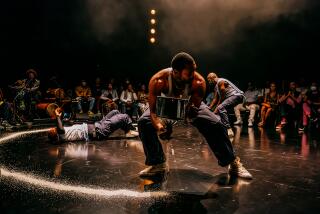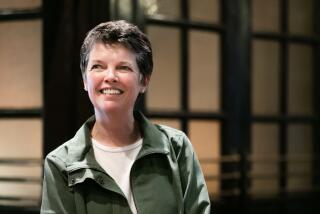A Druid Among the Dons : THE BOOK AND THE BROTHERHOOD <i> by Iris Murdoch (Viking: $19.95; 601 pp.) </i>
- Share via
What do you do with a gathering of cultivated, middle-aged people who have been friends for decades and become thoroughly familiar with each other’s ideas, darknesses and jokes? If you are a host, and the evening has turned rigid with all that sympathy, you might get everyone to dance.
It can be a novelist’s problem too. Say that your subject is society’s pillar: an educated professional upper middle-class whose political and metaphysical concerns have yellowed from being on display for so long and never used. How do you write about this dullness--the wrapping that muffles a spiritual and social crisis--without taking on dullness’s colors?
Iris Murdoch orders up a dance. She gets her threadbare British intellectuals, with their dwindling purses and passions, out of their chairs. She turns on the Pan-pipes music, slips lusts and obsessions into their coffee, paints their faces a Druid purple and--still in their tweeds and Ashley prints--has them twitching out pagan gyrations upon worn floors that sometimes give way.
With “The Book and the Brotherhood,” Murdoch has published 23 novels. When I reviewed her last one, “The Good Apprentice,” and the one before that, “A Philosopher’s Pupil,” I expect I mentioned the 22 and 21.
It was, and is, not just to indicate the near-Trollopian dimensions of her output, but to recognize that each new Murdoch book, whether stronger or weaker, is another piece of a living super-novel. Once again, a far-fetched Trollope comparison is appropriate.
The 19th-Century English novelist took a world--politics in the Palliser books, ecclesiastical politics in the Barchester cycle--and led us through a mass of mundane detail amazingly leavened by nuance; so that we are forced, aching and delighted by turns, to be engrossed.
Murdoch’s effect is similar. “This is tedious and trivial,” we may protest at one moment, as we follow one more five-cornered feud in her urbane and fractured world; and “I am helplessly caught up in it,” at the next. With Murdoch, of course, it is not 19th-Century parsons and MP’s, but scholars, artists, psychiatrists and shady tycoons whose daytime surfaces are filled out with the deftest of ironic realism and whose nighttime precincts flash with a passionate heat lightning that goes from Freudian to archaic.
Murdoch’s types recur. There is usually an inner circle of the more or less worldly wise, both innocent and cut off in their comfortable sophistication. There will be an enchanter figure, untamed and with a whiff of violence or even the supernatural about him. He is apt to be a writer or a philosopher--Murdoch’s philosophers are medieval alchemists--and dangerous. They are the Merlin of the Arthurian legend, powerful and ultimately frail.
It is the enchanter’s eruption into the circle that sends its members on inner or outer adventures that shatter them, sometimes heal them, and that become the equivalent of, again, medieval quests. Often there is a young person upon whom the heaviest burden of pain or guilt falls and whose quest is the most perilous; a scapegoat whose perdition or salvation supplies some of the fuel and fire to the action.
Upon these and other figures, Murdoch performs her variations. We recognize them. Sometimes they take us further than a previous variation. Sometimes they can seem like Murdoch parodying herself.
In “The Book and the Brotherhood,” we are presented right off with a dozen characters whose knotty problems, pasts, and relationships all must be explained. It is like fishermen unwinding their nets for hours on the beach before setting sail. You may wish that there could be a gadget that would read Murdoch’s beginnings for you in advance, so that you could get right out to sea with--all quirks aside--a wondrous helmsman.
We meet the dozen characters in the course of a summer-night outdoor festival at Oxford. It furnishes a background of pagan revelry, a turning dance like a carnival or witch’s sabbath, against which these characters seek each other out. “Tamar was looking for Conrad,” goes a characteristic Murdoch move. “Conrad was looking for Tamar. Rose and Jenkin were looking for Jean and Duncan and Conrad and Tamar.”
The urgent seeking, the crisis that erupts, are caused by the sudden appearance of Crimond, formerly an acquaintance of the circle that includes some of the seekers and sought: Rose, Jenkin, Duncan, and Jean (Tamar will become one of the scapegoats; Conrad is peripheral). He is a radical left-wing thinker, a seducer, a man who fascinates the circle--the brotherhood of the title--and who has violently disrupted it. He is the enchanter and he is first seen, again typically, dressed in a kilt and doing a Highland reel with enthralling strength. It is a Pan dance.
Gerard, the most conspicuous figure in Murdoch’s brotherhood, is a brilliant, retired senior civil servant with vague plans to write a book on Plotinus. Rose, altruistic and generous, has always been in love with him. He was in love with her brother, now dead. Before the book ends, he will be in love with Jenkin, a mild and seemingly unobtrusive teacher who turns out to be the group’s true center. He has also been in love with Duncan, another senior civil servant, who is married to Jean.
They went to school together, were left-wing together, and nowadays they eat and drink together and do a lot of visiting. Visits are Murdoch’s units of action; the plot, often melodramatic, is advanced by them. They produce confrontations, revelations and new entanglements.
Crimond is the brotherhood’s unconfronted wildness. Thoroughly ensconced in the Establishment, they live a proxy leftism by subsidizing a book he is writing that will proclaim a new and more radical program of revolution. The years pass, Crimond’s book is not finished, the brotherhood grows testy. And, some years before the novel begins, the link--though not the subsidy--is ruptured when Crimond runs off with Jean and seriously injures Duncan in a fight.
Jean returns, but the Oxford rebels set off a new round of disruption. Jean goes off again with Crimond, who exerts a cultlike spell over her; and returns to Duncan once more. Tamar falls in love with Duncan and has a disastrous abortion. Rose falls briefly in love with Crimond. The book is finished; a series of various confrontations end with one of the brotherhood shot dead by Crimond’s pistol, though not by Crimond. The death partakes of both misadventure and expiation.
“The Brotherhood” has flaws that place it some way below the level of “The Good Apprentice,” one of Murdoch’s best. The first hundred pages or so of preparation seem especially long and mannered, although there are splendid passages in them. Energy and magic then take over, but after the killing, they seep away. The final quarter seems largely a series of retrospective variations on a tension that is gone.
Perhaps the principal weakness is in the enchanter. Crimond is too flat, both in his ideas, which are a rehash of ultra-left post-Leninism, and above all in his person. He is eccentric, peevish and narrow. As an ironic characterization, this would be fine; but it does not provide enough music for a dance that is supposed to set off the entire cast into whirling transformations.
Despite these defects, Murdoch holds us enthralled for a good deal of the time, particularly in the middle section. There are passages of sustained brilliance: Tamar’s passion, a dark, gaudy ice-skating party. The visits build up a powerful charge of suspense. The characters, entirely recognizable, entirely modern, entirely futile are transformed by their dance.
Murdoch confirms her unique contribution to the English-language novel, even if this current stage of the process does not advance it greatly. She has fused the commanding patterns of commedia dell’arte to realism in such a way that, caught up by these entrancing patterns, we recognize ourselves in them; and noticing ourselves on any stolid enterprise, we may remember the patterns.
More to Read
Sign up for our Book Club newsletter
Get the latest news, events and more from the Los Angeles Times Book Club, and help us get L.A. reading and talking.
You may occasionally receive promotional content from the Los Angeles Times.










